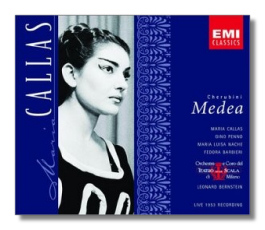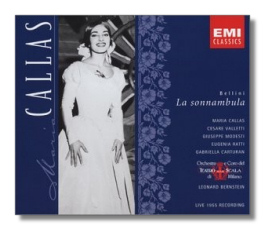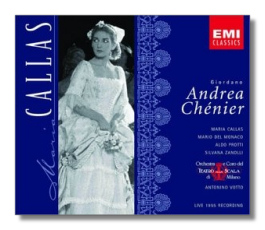
The Internet's Premier Classical Music Source
Related Links
- Latest Reviews
- More Reviews
-
By Composer
-
Collections
DVD & Blu-ray
Books
Concert Reviews
Articles/Interviews
Software
Audio
Search Amazon
Recommended Links
Site News
 CD Review
CD Review
Classic Performances, Remastered

Luigi Cherubini
Médea
- Maria Callas (Médea)
- Gino Penno (Giasone)
- Fedora Barbieri (Neris)
- Maria Luisa Nache (Glauce)
- Giuseppe Modesti (Creonte)
Orchestra & Chorus of La Scala, Milan/Leonard Bernstein
EMI Classics 67909 ADD monaural 2CDs: 52:08, 77:11


Vincenzo Bellini
La Sonnambula
- Maria Callas (Amina)
- Cesare Valletti (Elvino)
- Eugenia Ratti (Lisa)
- Giuseppe Modesti (Il conte Rodolfo)
- Gabriella Carturan (Teresa)
Orchestra & Chorus of La Scala, Milan/Leonard Bernstein
EMI Classics 67906 ADD monaural 2CDs: 74:57, 65:54


Umberto Giordano
Andrea Chénier
- Maria Callas (Maddalena di Coigny)
- Mario del Monaco (Andrea Chénier)
- Aldo Protti (Carlo Gérard)
Orchestra & Chorus of La Scala, Milan/Antonino Votto
EMI Classics 67913 ADD monaural 2CDs: 54:09, 53:36
Having reissued her studio recordings – several times, in many cases – EMI is now paying attention to Maria Callas's live documents. Unauthorized releases of these three particular live performances have been on the markets for decades. Abbey Road digital mastering can't make these somewhat crude (by today's standards) unofficial tapings into studio-polished recordings. On the other hand, it has made these documents less sonically challenging than they were in the past, and no one with a genuine appreciation for this music and for Callas's singing should have difficulty listening through the unavoidable sonic artifacts; remember, these performances were never intended for commercial release in the first place.
Médea is a pretty good opera, but all the stops need to be pulled out for it to come to life – otherwise, Cherubini's polite music seems at odds with the bloodthirsty action. (In brief: Médea is a foreigner who comes to town and kills her two children rather than let their father marry another woman – whom she also kills for good measure.) Callas's studio recording from 1957 (also released by EMI Classics) gets the major points across. This live performance from December 10, 1953 has decided advantages, however. One, Callas is in better voice. Two, dramatic points are made far more strongly here; in the studio, Callas was imposing, but here she was terrifying, a veritable tigress. Three, conductor Tullio Serafin meant well on the studio recording, but it took someone from outside the Italian opera tradition – someone like Leonard Bernstein – to reveal all the passion hiding within Cherubini's classicism.
This was Callas's first La Scala Médea. She had performed the role three times that spring in Florence, and, after a five-performance run at La Scala, she would return to it about two dozen more times. Vocally, this is Callas at her best. Dramatically, she might have made refinements in later productions, but this is a finished portrayal, replete with betrayal, grief, cunning, maternal tenderness, vengeance, and all-consuming rage. One can't understand the Callas phenomenon from studio recordings alone. Of her preserved live work, perhaps this is the most archetypal.
The other singers are at least competent, ranging from Penno's whiny Giasone to Barbieri's solid Neris. One advantage of the studio recording is the presence of a young Renata Scotto, but a good Glauce hardly tips the balance. Bernstein, a last-minute substitution for Victor de Sabata, learned the score in five days. His fiery disposition complements Callas's perfectly; thanks to Bernstein, this is Classical opera with the kid gloves off, veering dramatically into the age of Romanticism.
A loud prompter, overloaded climaxes, and other sonic blemishes are not nearly as troubling as one might fear. It is not difficult to listen through these minor distractions and to discern the soul of opera itself.
Amina from La Sonnambula and Médea are light years apart. Amina's sweetness will have some listeners reaching for the insulin; her only undesirable trait is that she sleepwalks. When she, on the eve of her wedding, sleepwalks her way into the bedroom of a man who is not her intended husband, the expected complications ensue. It all ends well, however, with Amina vindicated before all. Dramatically and musically, this is thin stuff – much thinner than Médea. La Scala realized this when they revived it for Callas in 1955, so they brought in Luchino Visconti to direct the production. Visconti astutely stylized the opera, turning Amina and her bridesmaids into a dreamy corps de ballet. Only during the finale, when the house lights were brought up, were the quotation marks removed from La Sonnambula. The team of Callas, Visconti, and Bernstein (incandescent as before) made Bellini's creaky opera viable, a feat few have dared even to attempt since then.
As with Médea, this is a recording from the production's opening night: March 5, 1955. (There were ten performances in all. La Scala revived the production for twelve more performances in 1957, and once those were completed, Callas never sang Amina again.) It was the 1957 cast that made the commercial recording for EMI. By then, Bernstein had moved on, and he was replaced by the dull Antonino Votto. Valletti, so effective as the jealous groom in 1955, also was replaced by an inferior. As with Médea, then, the studio recording is pallid next to the live recording reviewed here.
Callas, still close to her peak vocally, has the audience eating out of her hands; the demonstration that follows "Ah! non giunge" drowns out the opera's last moments. The diva does more with this droopy heroine than one would have thought possible, and her singing, particularly during her periods of somnambulism, isn't quite "there" – an effect which contributes to the production's air of unreality. Médea highlights Callas's intensity, but La Sonnambula is all about her intelligence and sensitivity. Even with downward transpositions, Valletti makes something good out of the rather unpleasant role of Elvino. Modesti is a competent Rodolfo (he sounds too old for the role), and Ratti an appropriately shrewish Lisa – she wants Elvino for herself and is only too glad to blow the whistle on the sleepwalking Amina. Carturan's Teresa is sympathetic, but collectors probably will prefer the young Fiorenza Cossotto's interpretation on the studio recording.
The prompter is more discreet here, but the expected sonic imperfections are here too… and are powerless to diminish the power of Callas, Valletti, and Bernstein.
The previous two operas were Callas's showcases. In contrast, Andrea Chénier, mounted by La Scala in January and February 1955, was supposed to have been tenor Mario del Monaco's show. At first, La Scala scheduled Il trovatore, but the tenor, claiming indisposition, suggested Giordano's opera instead. Some have suggested that he was intimidated by the prospect of singing Manrico to what probably would have been a riveting Leonora from Callas. As Callas had not sung Maddalena before, perhaps he thought he would come off as the stronger of the two. It is also possible that he thought that Callas would defer to her rival Renata Tebaldi, a classic Maddalena and a favored partner for del Monaco.
Not so fast, Mario. Callas learned the role in five days. The first-night audience of January 8, 1955 – the performance preserved here – was prepared for fireworks, and also prepared to supply some of their own. Pro-Callas, pro-Tebaldi, and pro-del Monaco factions all showed up that night. Callas's detractors, it is said, found any excuse to rattle her – by extravagantly cheering every lead's performance but hers, and by responding nastily to perceived faults in her singing. (Just as the French Revolution devoured its children, so does opera.) Callas, in spite of it all, is a powerful, memorable Maddalena, most of all in "La mamma morta," the only part of the opera she had sung prior to the production. She never made a studio recording of the entire role, so this is all we have of Callas's Maddalena. It's not a role to which she was naturally suited, but – let's face it – she wipes up the floor with both del Monaco and Protti here. This is guts and glory singing, not subtle, but not afraid to walk the tightrope without a net. Performances like this just don't happen anymore.
Del Monaco opens his mouth and lets his big sound out with little shaping or sensitivity. As a purely sensual experience, his solos are enjoyable, but what coloring he brings to the role is strictly primary. Protti makes a good showing in Act One; after that, he's spent, and "Nemico della patria" is thrown away. La Scala, though, shows its overall strength through the many telling characterizations in the smaller roles. Votto shows his mettle too – apparently he was better in the theater than in the recording studio.
Unpleasantly peaky sound requires patience from the listener, but – as with the other two recordings reviewer here – it's worth it.
Copyright © 2003, Raymond Tuttle


















